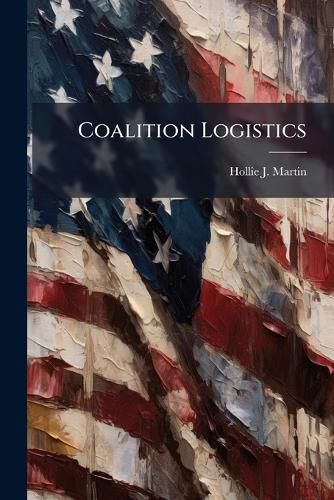Readings Newsletter
Become a Readings Member to make your shopping experience even easier.
Sign in or sign up for free!
You’re not far away from qualifying for FREE standard shipping within Australia
You’ve qualified for FREE standard shipping within Australia
The cart is loading…






The need for security assistance through coalitions and logistics remains important for achieving success in the Global War on Terrorism (GWOT) and in the US Government's (USG's) promotion of democracy. Coalition or international logistics are even more important today than in the past. Considering the constraints of the current, complex, adaptive, operational environment, coalition logistics allow the nation to maintain international involvement while bolstering cooperation with friends and allies. In order to maximize the benefits of international cooperation through military assistance programs, scholars, politicians, national and international leaders, military planners, and logisticians must continually assess foreign policy goals and devise long-range plans that integrate and leverage resources. History reveals coalition logistics as a critical capability in securing peace and claiming victory. This study focuses on three stability and support operations that involved the US military and international partners: post-World War II Germany, Haiti, and East Timor. Leaders who examine the shortfalls of US support capabilities, as evidenced by history, can determine how coalition logistics capabilities can lessen the burden of support. Focusing on security assistance, the work highlights the USG's practices for bolstering military capabilities of allies and provides insight for future developments. Further, this monograph highlights strategic and operational level implications for coalition logistics that apply to developing a concept of support, integrated planning, and today's security environment.
This work has been selected by scholars as being culturally important, and is part of the knowledge base of civilization as we know it. This work was reproduced from the original artifact, and remains as true to the original work as possible. Therefore, you will see the original copyright references, library stamps (as most of these works have been housed in our most important libraries around the world), and other notations in the work.
This work is in the public domain in the United States of America, and possibly other nations. Within the United States, you may freely copy and distribute this work, as no entity (individual or corporate) has a copyright on the body of the work.
As a reproduction of a historical artifact, this work may contain missing or blurred pages, poor pictures, errant marks, etc. Scholars believe, and we concur, that this work is important enough to be preserved, reproduced, and made generally available to the public. We appreciate your support of the preservation process, and thank you for being an important part of keeping this knowledge alive and relevant.
$9.00 standard shipping within Australia
FREE standard shipping within Australia for orders over $100.00
Express & International shipping calculated at checkout
Stock availability can be subject to change without notice. We recommend calling the shop or contacting our online team to check availability of low stock items. Please see our Shopping Online page for more details.
The need for security assistance through coalitions and logistics remains important for achieving success in the Global War on Terrorism (GWOT) and in the US Government's (USG's) promotion of democracy. Coalition or international logistics are even more important today than in the past. Considering the constraints of the current, complex, adaptive, operational environment, coalition logistics allow the nation to maintain international involvement while bolstering cooperation with friends and allies. In order to maximize the benefits of international cooperation through military assistance programs, scholars, politicians, national and international leaders, military planners, and logisticians must continually assess foreign policy goals and devise long-range plans that integrate and leverage resources. History reveals coalition logistics as a critical capability in securing peace and claiming victory. This study focuses on three stability and support operations that involved the US military and international partners: post-World War II Germany, Haiti, and East Timor. Leaders who examine the shortfalls of US support capabilities, as evidenced by history, can determine how coalition logistics capabilities can lessen the burden of support. Focusing on security assistance, the work highlights the USG's practices for bolstering military capabilities of allies and provides insight for future developments. Further, this monograph highlights strategic and operational level implications for coalition logistics that apply to developing a concept of support, integrated planning, and today's security environment.
This work has been selected by scholars as being culturally important, and is part of the knowledge base of civilization as we know it. This work was reproduced from the original artifact, and remains as true to the original work as possible. Therefore, you will see the original copyright references, library stamps (as most of these works have been housed in our most important libraries around the world), and other notations in the work.
This work is in the public domain in the United States of America, and possibly other nations. Within the United States, you may freely copy and distribute this work, as no entity (individual or corporate) has a copyright on the body of the work.
As a reproduction of a historical artifact, this work may contain missing or blurred pages, poor pictures, errant marks, etc. Scholars believe, and we concur, that this work is important enough to be preserved, reproduced, and made generally available to the public. We appreciate your support of the preservation process, and thank you for being an important part of keeping this knowledge alive and relevant.